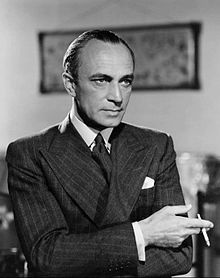Conrad Veidt
| Conrad Veidt | |
|---|---|

in 1941
|
|
| Born |
Hans Walter Konrad Weidt 22 January 1893 Berlin, Germany |
| Died | 3 April 1943 (aged 50) Hollywood, California, United States |
| Cause of death | Heart Attack |
| Occupation | Actor |
| Years active | 1917–1943 |
| Spouse(s) |
Gussy Holl (1918–1922) Felicitas Radke (1923–1932; 1 child) Ilona Prager (1933–1943; his death) |
Hans Walter Conrad Veidt (22 January 1893 – 3 April 1943) was a German actor best remembered for his roles in films such as The Cabinet of Dr. Caligari (1920), The Man Who Laughs (1928), and, after being forced to migrate to Britain by the rise of Nazism in Germany, his English-speaking roles in The Thief of Bagdad (1940), and, in Hollywood, Casablanca (1942). After a successful career in German silent film, where he was one of the best-paid stars of Ufa, he left Germany in 1933 with his new Jewish wife after the Nazis came to power. They settled in Britain, where he participated in a number of films before emigrating to the United States around 1941.
Veidt was born in a bourgeois district of Berlin, Germany, the son of Amalie Marie (née Gohtz) and Phillip Heinrich Veidt. (Some biographies wrongly state that he was born in Potsdam, probably on the basis of an early claim on his part.) His family was Lutheran.
In 1914, Veidt met actress Lucie Mannheim, with whom he began a relationship. Later in the year Veidt was conscripted into the German Army during World War I. In 1915, he was sent to the Eastern Front as a non-commissioned officer and took part in the Battle of Warsaw. He contracted jaundice and pneumonia, and had to be evacuated to a hospital on the Baltic Sea. While recuperating, he received a letter from Mannheim telling him that she had found work at a theatre in Libau. Intrigued, Veidt applied for the theatre as well. As his condition had not improved, the army allowed him to join the theatre so that he could entertain the troops. While performing at the theatre, he ended his relationship with Mannheim. In late 1916, he was reexamined by the Army and deemed unfit for service; he was given a full discharge in January 1917. Veidt returned to Berlin to pursue his acting career.
...
Wikipedia
